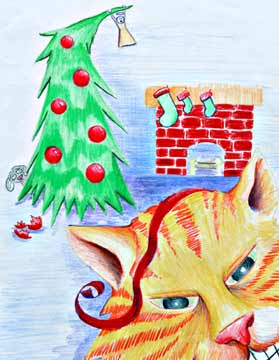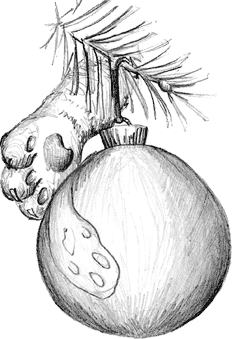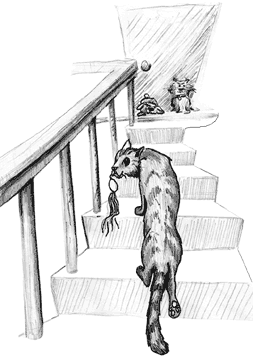|
|

Christmas is a hard time to find a kitty, but Bill was dogged.
by Sandra Martin; recounted by Bill Lambrecht; Illustrated by Betsy Kehne
Bill should have known that this quest wouldn’t be easy. Except at dinner time, there is never a cat when you need one. When it is time to go to the vet or come in for the night, where is the cat? Your ‘here kitty, kitty, kitties’ fall on deaf ears. Even a white cat disappears into the background — whether that be the green of spring or the butterscotch of leafy autumn — when you want him. This was a lesson Bill could have learned from experience.
But he was an investigative reporter, doggedly persistent in digging up the buried bones of chicanery. Finding a kitten ought to be a walk in the park.
So when his wife said, “While you’re back home for Christmas, why don’t you get my Mother a kitten?”
he’d said, “I can do that.”
Prescription Kitten
The diagnosis was loneliness, seasoned with boredom.
With too much time on her hands, Bill’s mother-in-law was sure to get into trouble. After a lifetime of giving orders and moving walls, if walls needed to be moved in the pursuit of her goal, Elsa lived alone. She had not a thing in the world more she needed to do than clean and reclean her empty three-bedroom house. Not a person whose comings and goings she could direct. Even her dogs, yappy little things that might have needed a lot of management, were listless.
Elsa’s daughter Sandra, who lived far away, had inherited her mother’s conviction that she knew best. Now what she knew best was that Elsa needed a kitten.
Her conviction had been growing since Elsa tamed Little Black Kitty.
“I know what you need,” Elsa had said when the tiny refugee puffed up to twice his size and sidled away like some midnight genetic cross between a crab and a cotton ball.
It had been summer on Chesapeake Bay, and the crab pots were full. Elsa fed the foundling on crab and cream. Eating, he had won her heart.
As Kitty climbed trees, hopped in the canoe or stalked a crab escaped from the bushel, Elsa rediscovered the forgotten truth that nothing’s more fun than a kitten.
But when the time came for Elsa to go back home, she left her kitty on Chesapeake Bay.
“ I don’t see how I can take him on the plane,” she said. “And what would the dogs think?”
Now with her every phone call she wondered how her Maryland kitty was doing.
Christmas loomed blue for Elsa that year. One grandson was in England, the other on the West Coast. She couldn’t visit, and Sandra couldn’t come home. Except for Bill’s brief Christmas Eve visit, Elsa would be alone.
“What Mother needs,” said Sandra, “is a kitty under the tree.”
Which made Bill a man with a plan.
Bill’s Kitty Quest
“Leave me a key so I can come back this afternoon,” Bill told Elsa after she’d fixed him one of her famous breakfasts.
“Don’t you have to get home to your family?” she’d asked. It was Christmas Eve, and Bill’s family home was 160 miles away, across a prairie blowing with snow.
“Not right away,” he said, and set out for the humane society.
Kittens had always come easily. They jumped into your arms on doorsteps, followed you home, were wheedled into your life by friends whose mama cat had had a litter or by those who had happened upon a kitty family living in half a cinderblock.
Now he’d come looking for a kitty at a place that certainly smelled like cat; it reeked like the big-cat house used to at the zoo. But the only cats in residence on Christmas Eve were hard cases who’d been around enough to know when a fellow was looking for a kitten. They didn’t bother with any cute come-ons.
Neither did the human intake worker. “A kitten at Christmas? You’ve got to be kidding. Kittens aren’t born this time of year, and if we had an odd litter, they’d be long gone.”

The Kitty Conspiracy
“That’s my problem,” Bill told his father-in-law over a hot cup of coffee.
“Are you sure you wouldn’t rather have an eggnog with a shot of bourbon?” asked Gene Martin, who lived right down the road from the shelter.
After their divorce, Gene and Elsa had settled into a spatful brother- and sisterly-ness. A plan that would certainly take Elsa by surprise and might inconvenience her suited Gene just fine. “A kitten,” he said, rubbing his hands together. “I bet those damn dogs of hers won’t like that.”
Armed with a thick phone book, the two men settled into conspiracy.
Among Gene’s standards for competence was the ability to manage the phone book. At that skilled task, Elsa was only so-so, and for too long a time his only daughter threatened to be no whiz, either. So Gene approved when Bill skipped the letters K and C and turned instead to Animals. He found Welfare Leagues and Societies for the Prevention and the Protection. But there was nary a live voice at any number.
“It’s Christmas Eve,” said Gene.
“They’re probably all volunteers,” said Bill.
Among the messages shrilled one busy signal.
“That’s way out in the county, anyway” said Gene, who knew places the way a GPS system does today.
Outside, heavy skies seemed to be pushing the temperature lower. It looked like snow, and home was four hours away; faster, maybe, if the roads were slick.
Bill turned to Pets. There, after Pet Cemeteries and Pet Salons, he found Pet Shops. Many pet shops.
“Here, give me the book,” said Gene. “We’ll start with the nearest one.”
The phone rang a long time — six, seven, eight, nine rings — before it connected. “Hello,” Bill shouted, hearing the connection just as he was about to break it. Then the line died with a terrible thump. When he called back, the line was busy.
Three more numbers were busy, too. The fourth rang and rang and rang. The fifth picked up, eventually, and after six or seven interruptions, Bill got his question out.
“Kittens?” the voice at the other end demanded. “You want kittens? You and four dozen more. The only cat around here is dead in the back alley. If you want a cat this Christmas, you’ll have to steal it.”
So for Christmas cheer, Gene and Bill had eggnog after all. Then they put on their thinking caps. Under Bill’s, a hunch hatched. He trusted his hunches.
“I think I’ll try that one in the county again,” he said. “The first busy one. Read it again to me, Gene.”
On the third ring, the number answered.
“I’m looking for kittens,” Bill blurted, before the voice on the other end could speak.
“Mittens, mittens? You’ll have to try a department store.”
“No, kittens, kittens with a K, not mittens.”
“Ahha,” laughed the voice on the other end. “Kittens. Kittens.”
Silence followed. A long silence, in which the radiators in his father-in-law’s kitchen clicked and whistled. But there was no click on the other end, so he held on.
“Kittens,” a different voice brought the line to life. It was deep and hollow and gave every vowel its own syllable. “We-may-ha-ve-kit-tens.-May-be-some -kit-tens.-Did-you-res-er-ve-a-kit-ten?”
“He wants to know if I have a reservation,” Bill whispered to Gene.
“Tell him you do,” said Gene.
And Bill’s answer must have been the right one, for the low, slow voice agreed that, up until 12 noon, there might be kittens.
 Not a Kitten Was Stirring Not a Kitten Was Stirring
Bill set out for the county.
Before he could make it to the car, wind snatched his directions. But he could probably remember them, so away he went, over roads clogging with last-minute shoppers. He thought he knew the way, and he might have, but one wrong turn led to another.
Far away from anywhere he’d ever hoped to be, at three minutes after noon, he pulled into a convenience store about as forlorn as the cats he’d seen that morning — except maybe they weren’t so bad, on second thought.
The Yellow Pages had been torn or blown away from the wind-whipped outdoor phone kiosk, so he called Gene. Then he dialed the shelter’s number. On the eighth ring, they picked up. Bill heard a message machine say closed for the holidays.
But maybe they hadn’t closed all the way, he told himself. After all, he’d come this distance, and he wasn’t so far off as he’d thought, Gene guessed. He might as well push on — and put off the dickens he’d get when he called back to Chesapeake Bay to confess failure.
Bill pulled up at only 10 past noon, maybe less if the clock in his rented car were fast. The lights were off, but one truck was still in the back lot, its engine running and windows defrosting. So far, luck was with him, he thought. He was on the trail of two purring kittens. Probably at least one of them was orange, he imagined, and that was his favorite cat.
The shelter’s back door opened and a sweet-faced girl pushed through. She was carrying a cage that swayed and thumped.
“No orange kittens,” she told Bill, “and they’re not exactly kittens …”
Bill was about to score.
“More like teenagers. Like this fellow,” she said, pointing to her caged tuxedo cat. “He’s mine. His sisters — one’s black with white spots and one’s white with black spots — have gone back to their foster homes for the holidays. They’ll be back the day after Christmas. Can you come back then?”
The Kitty Caper
He’d go back to Elsa’s, leave her presents under the tree and head for home, Bill thought. There’d be plenty of time for kitties — and plenty of kitties — in the seasons ahead. Eventually, Elsa would move to Maryland; maybe that’s when they’d get her a kitty.
So he took the turn onto Olive Street Road with the resigned grimness that you learn when too many Christmases have come and gone without kittens under your tree or wishes come true.
He wouldn’t have turned into the strip mall if it hadn’t occurred to him to bring some real bagels home from the neighborhood deli. So what if they weren’t quite right for Christmas; they were good.
He wouldn’t have seen the pet store if his parking space hadn’t been snatched by a grinch who probably had more troubles than he did.
If he hadn’t, what the heck, gone in, he wouldn’t now be turning into Elsa’s driveway with the last kitty in all the city.
He’d had to out-maneuver a whining kid for whom the right pet would have thick skin and cold blood. He’d never paid money for a cat before, and this one had cost $35. But he had Elsa’s kitty, and the kitty was orange.
 Sam the Christmas Kitty Sam the Christmas Kitty
“I suppose you know what that husband of yours has done?” Elsa demanded when Sandra picked up the phone. It wasn’t a question.
“He thinks he put one over on me. But I knew he was up to something. The dogs told me something was wrong in the boys’ bedroom, and when I opened the door, there this was, curled up on the bed staring at the dogs and me.
“It’s hardly a kitten, all ears and elbows. And Bill’s note says he’s a boy, so he’ll probably pee all over. It says his name is Max, but that was my brother’s name. I’m going to call him Sam. Kitty-Cat Sam.
“He’s bad. Look at him, he’s taken the ornaments off the tree. Now he’s in my lap.”
Over the long-distance line, Elsa chided and Sam purred.
The Cat’s Pajamas
Sam was trouble. He never got over his fondness for Christmas ornaments. After Christmas was done and Elsa moved the artificial tree down to the basement, Sam plucked it of all its red silk-thread ornaments and, in his mouth, carried them one by one upstairs.
True to the nature of a cat, Sam was never there when Elsa wanted him. She bragged to her friends that her clever cat was the cat’s pajamas and invited them over to see. But when any one of them came, Sam was out of sight. “We don’t think you have a cat,” Ginny and Kay teased. Elsa insisted she did, but when she looked to red ornaments for proof, they had gone, too.
The pair of yappy dogs went in and out as they liked into Elsa’s fenced backyard, but Sam, who had proved he could climb, had to stay inside. Spring had come and all was green before Sam got to go out. He stayed in sight, chasing sunbeams as Elsa raked and weeded. But when it was time to go in, there was no Sam. Elsa called and called and set out little dishes of chicken cooked just for him, but darkness fell and still no Sam.
She sat up late, but still no Sam. In bed, she tossed and worried. After one in the morning, her ears pricked. She sat up. She listened. And listened. Yes, faintly she could hear Sam’s voice.
The night was warm and her nightgown flimsy as she searched for him in the yard. Her flashlight beam finally found him, high up in the budding apple tree. Elsa hauled the big extension ladder from the shed and braced it against the tree where Sam cried piteously. Up she climbed, and Sam jumped on her shoulder. That’s the image her next-door neighbor saw when, wakened by all the racket, he turned his flashlight on tree, ladder, cat and Elsa.
“He’s always playing jokes on me,” Elsa reported to her daughter. “That Sam’s a lot like Gene Martin”
Epilogue
My mother died that August, when the apples on her tree were nearly ripe, and Sam had taken to batting around windfalls instead of Christmas tree balls. For the last seven months of her life, Elsa was never bored and seldom lonely. With Sam on their case, even the dogs seemed to have taken out a new lease on life. After Elsa was gone and the dogs were adopted by friends, the poodle surprised her new owner with a litter of puppies.
Sam became a college cat. But that is another story.
This year, a granddaughter was born to carry on Elsa’s name. And that is another life.
Copyright 2001
Bay Weekly
|